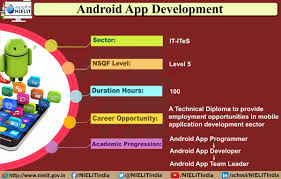Android App Development: A Comprehensive Guide
With the widespread use of smartphones and tablets, Android app development has become a crucial skill for developers looking to create innovative and user-friendly applications. Whether you are a beginner or an experienced developer, mastering the art of Android app development can open up a world of opportunities.
Getting Started with Android App Development
To start your journey in Android app development, you will need to familiarise yourself with the Android SDK (Software Development Kit) and the Java programming language. The Android SDK provides a set of tools and libraries that are essential for building Android applications, while Java is the primary language used for Android app development.
Key Components of Android App Development
When developing an Android app, there are several key components to consider:
- User Interface (UI): Designing an intuitive and visually appealing user interface is essential for creating a successful Android app. Utilise XML layouts and widgets to create engaging user experiences.
- Activities: Activities are the building blocks of an Android app. Each screen in your app is represented by an activity, which handles user interactions and displays content.
- Fragments: Fragments allow you to create flexible UI designs that can adapt to different screen sizes and orientations. By using fragments, you can build dynamic and responsive apps.
- Intents: Intents facilitate communication between different components of your app or even between different apps. They allow you to launch activities, send data between components, and more.
- Data Storage: To store data locally on an Android device, you can use SQLite databases, SharedPreferences, or files. Understanding how to effectively manage data storage is crucial for creating efficient apps.
Testing and Deployment
Once you have developed your Android app, it is essential to thoroughly test it on various devices and screen sizes to ensure compatibility and functionality. You can use emulators or physical devices for testing purposes. After testing, you can deploy your app to the Google Play Store or other distribution platforms to reach a wider audience.
Continual Learning and Improvement
The field of Android app development is constantly evolving, with new technologies and trends emerging regularly. To stay competitive in this fast-paced industry, it is crucial to continually update your skills, learn new techniques, and adapt to changing requirements.
By following best practices in Android app development and staying informed about the latest developments in the ecosystem, you can create cutting-edge apps that delight users and stand out in the crowded marketplace.
Exploring the Advantages of Android App Development: Market Reach, Open Source, Tools, Google Integration, and Monetisation
- Wide Market Reach
- Open Source Platform
- Diverse Development Tools
- Integration with Google Services
- Monetisation Opportunities
Challenges in Android App Development: Fragmentation, Security Concerns, and Market Saturation
Wide Market Reach
With its largest market share globally, Android offers developers an extensive audience for their apps, ensuring a wide reach and potential for success. By targeting the Android platform, developers can tap into a diverse user base and maximise their app’s visibility and impact on a global scale. This broad market presence allows developers to reach millions of users across various devices, making Android app development a lucrative opportunity for those looking to expand their reach and engage with a large and diverse audience.
Open Source Platform
Android’s open-source platform is a significant advantage for developers as it offers the flexibility to customise and modify the platform to suit their specific requirements. This freedom empowers developers to create unique and innovative apps that cater to diverse user needs. By leveraging the open nature of Android, developers can access a wealth of resources, collaborate with the community, and tailor their apps with greater precision, ultimately leading to a more personalised and tailored user experience.
Diverse Development Tools
Android app development comes with the significant advantage of diverse development tools. The Android platform provides a wide array of tools and resources that empower developers to build top-notch applications with ease. From robust integrated development environments (IDEs) to extensive libraries and frameworks, Android offers a rich ecosystem that streamlines the app development process and enables developers to deliver high-quality, innovative apps to users. This variety of tools not only enhances productivity but also fosters creativity, allowing developers to explore new possibilities and push the boundaries of mobile app development.
Integration with Google Services
Android app development offers a significant advantage through its seamless integration with a variety of Google services. By leveraging services like Maps, Analytics, and Cloud Messaging, developers can enhance the functionality and user experience of their apps. Integration with Google Maps allows for location-based features and navigation within applications, while Google Analytics provides valuable insights into user behaviour and app performance. Additionally, utilising Cloud Messaging enables real-time communication and notifications, enhancing user engagement. Overall, the integration with Google services empowers developers to create more dynamic and feature-rich Android apps that cater to the needs of modern users.
Monetisation Opportunities
Developers engaging in Android app development benefit from a plethora of monetisation opportunities on the platform. With options such as in-app purchases, advertisements, and subscription models available, developers can strategically leverage these avenues to generate revenue from their apps. This flexibility in monetisation methods allows developers to tailor their strategies based on their app’s target audience and business objectives, ultimately maximising their earning potential in the competitive app market.
Fragmentation
Fragmentation in Android app development poses a significant challenge due to the diverse range of Android devices available, each with varying screen sizes, resolutions, and hardware specifications. This variability can result in compatibility issues and difficulties in maintaining consistent performance across all devices. Developers often face the daunting task of optimising their apps for multiple screen configurations and hardware capabilities, which can lead to increased development time and resources. Managing fragmentation requires careful planning and testing to ensure a seamless user experience across the wide spectrum of Android devices in the market.
Security Concerns
Security Concerns: Android apps are more susceptible to security vulnerabilities compared to iOS apps due to the open nature of the Android platform. The fragmented nature of the Android ecosystem, with various device manufacturers and versions of the operating system in use, can make it challenging to ensure consistent security standards across all devices. Developers need to be vigilant in implementing robust security measures, such as data encryption, secure authentication mechanisms, and regular security updates, to protect user data from potential threats and breaches. Prioritising security in Android app development is essential to build trust with users and safeguard sensitive information effectively.
Market Saturation
Market Saturation is a notable con of Android app development, as the Google Play Store is inundated with millions of apps, making it challenging for developers to distinguish their creations and capture users’ attention. Standing out amidst the vast competition necessitates not only exceptional app features but also strategic marketing initiatives to attract and retain users. In such a saturated market, developers must employ innovative strategies to ensure their apps gain visibility and maintain relevance in the ever-evolving digital landscape.




